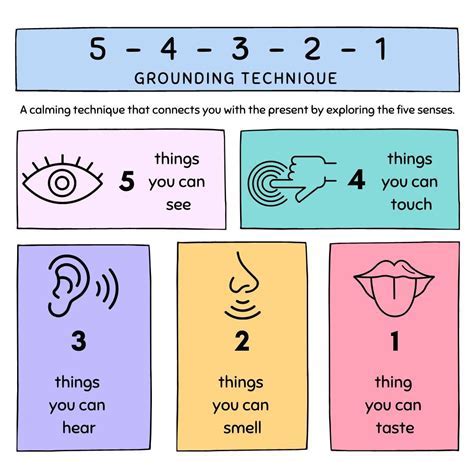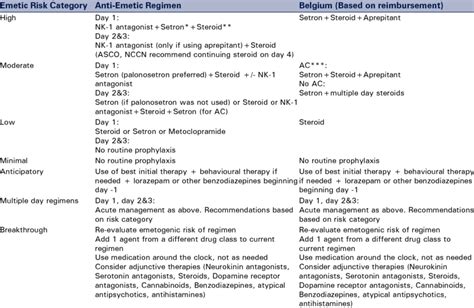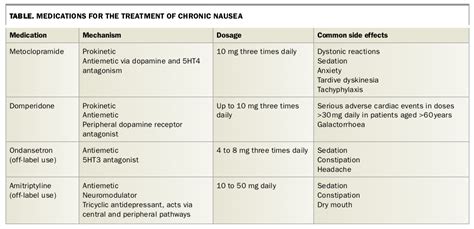Intro
Discover 5 effective ways to treat nausea, including natural remedies, dietary changes, and lifestyle adjustments, to alleviate symptoms of nausea and vomiting, and improve overall digestive health and well-being.
Nausea is an uncomfortable and debilitating sensation that can affect anyone, regardless of age or health status. It can be triggered by a variety of factors, including motion sickness, food poisoning, pregnancy, and certain medical conditions. When nausea strikes, it can be challenging to focus on daily activities, and in severe cases, it can lead to dehydration and other complications. Fortunately, there are several effective ways to treat nausea, and in this article, we will explore five of the most popular methods.
Nausea can be a symptom of an underlying condition, or it can be a standalone issue. In either case, it is essential to address the problem promptly to prevent it from escalating into a more severe condition. The good news is that there are many natural and medical treatments available to alleviate nausea. From dietary changes to medication, we will delve into the various options that can help you manage nausea and regain control over your health.
The importance of treating nausea cannot be overstated. When left untreated, nausea can lead to a range of complications, including dehydration, electrolyte imbalances, and malnutrition. Moreover, nausea can significantly impact a person's quality of life, making it challenging to work, socialize, or engage in activities they enjoy. By understanding the causes of nausea and exploring effective treatment options, individuals can take the first step towards regaining their health and well-being.
Understanding Nausea

Causes of Nausea
The causes of nausea can be broadly categorized into three main groups: physiological, psychological, and environmental. Physiological causes include hormonal changes, digestive issues, and other medical conditions. Psychological causes include stress, anxiety, and other emotional factors. Environmental causes include sensory stimuli, such as motion, smells, or tastes. By understanding the underlying causes of nausea, individuals can develop targeted strategies to manage their symptoms and prevent future episodes.Treatment Options for Nausea

- Dietary changes: Eating small, frequent meals, avoiding trigger foods, and staying hydrated can help alleviate nausea.
- Ginger: Ginger has natural anti-inflammatory properties that can help soothe the stomach and reduce nausea.
- Acupressure: Applying pressure to specific points on the body, such as the P6 point, can help alleviate nausea and vomiting.
- Medication: Over-the-counter and prescription medications, such as antihistamines and antiemetics, can help manage nausea and vomiting.
- Relaxation techniques: Stress-reducing activities, such as deep breathing, meditation, and yoga, can help alleviate nausea and promote overall well-being.
Benefits of Treating Nausea
Treating nausea can have a significant impact on a person's quality of life. By alleviating nausea, individuals can regain their appetite, improve their digestion, and reduce their risk of complications. Moreover, treating nausea can help individuals manage stress, anxiety, and other emotional factors that contribute to the condition. By developing a comprehensive treatment plan, individuals can take control of their health and well-being, reducing the impact of nausea on their daily lives.Dietary Changes for Nausea

- Eating bland foods: Foods like crackers, toast, and plain rice can help settle the stomach and reduce nausea.
- Avoiding spicy or fatty foods: Spicy and fatty foods can irritate the stomach and exacerbate nausea.
- Staying hydrated: Drinking plenty of water, clear broths, and electrolyte-rich beverages can help replace lost fluids and electrolytes.
- Avoiding trigger foods: Identifying and avoiding foods that trigger nausea can help individuals manage their symptoms and prevent future episodes.
Importance of Hydration
Hydration is essential for managing nausea. When the body is dehydrated, it can lead to a range of complications, including electrolyte imbalances, dizziness, and weakness. By drinking plenty of fluids, individuals can help replace lost electrolytes, settle the stomach, and alleviate nausea. Some of the best beverages for hydration include water, clear broths, and electrolyte-rich drinks like coconut water or sports drinks.Natural Remedies for Nausea

- Ginger: Ginger has natural anti-inflammatory properties that can help soothe the stomach and reduce nausea.
- Peppermint: Peppermint oil or tea can help calm the stomach and reduce nausea.
- Acupressure: Applying pressure to specific points on the body, such as the P6 point, can help alleviate nausea and vomiting.
- Aromatherapy: Certain scents, such as lavender or chamomile, can help calm the mind and body, reducing nausea and promoting relaxation.
Benefits of Natural Remedies
Natural remedies can offer several benefits for managing nausea. They are often gentle, non-invasive, and free from side effects, making them an attractive option for individuals who prefer a holistic approach to health. Moreover, natural remedies can be used in conjunction with medical treatments, providing a comprehensive approach to managing nausea. By exploring natural remedies, individuals can take control of their health and well-being, reducing their reliance on medication and promoting overall wellness.Medical Treatments for Nausea

- Antihistamines: Antihistamines, such as meclizine or dimenhydrinate, can help alleviate nausea and vomiting caused by motion sickness or other conditions.
- Antiemetics: Antiemetics, such as ondansetron or metoclopramide, can help manage nausea and vomiting caused by medical conditions, such as chemotherapy or gastroenteritis.
- Prescription medications: Prescription medications, such as scopolamine or prochlorperazine, can help manage severe nausea and vomiting.
Importance of Medical Supervision
Medical supervision is essential when using medical treatments for nausea. A healthcare professional can help individuals develop a personalized treatment plan, monitor their symptoms, and adjust their medication as needed. Moreover, medical supervision can help individuals avoid potential side effects, interactions, or complications associated with medical treatments. By working closely with a healthcare professional, individuals can ensure they receive the most effective treatment for their nausea, while minimizing the risk of adverse effects.Conclusion and Next Steps

If you are struggling with nausea, we encourage you to take the first step towards seeking help. Talk to your healthcare professional about your symptoms, and explore the various treatment options available. With the right approach, you can alleviate nausea, promote digestive health, and regain control over your well-being. Remember, nausea is not something you have to live with – there are many effective treatments available to help you manage your symptoms and improve your quality of life.
What are the most common causes of nausea?
+Nausea can be caused by a range of factors, including hormonal changes, digestive issues, and sensory stimuli. Some of the most common causes of nausea include motion sickness, food poisoning, pregnancy, and certain medical conditions.
What are the best natural remedies for nausea?
+Some of the most popular natural remedies for nausea include ginger, peppermint, acupressure, and aromatherapy. These remedies can help soothe the stomach, reduce inflammation, and promote relaxation.
When should I seek medical attention for nausea?
+You should seek medical attention for nausea if you experience severe vomiting, dehydration, or abdominal pain. Additionally, if you have a fever, bloody stools, or difficulty breathing, you should seek immediate medical attention.
Can nausea be a symptom of an underlying condition?
+Yes, nausea can be a symptom of an underlying condition, such as gastroesophageal reflux disease (GERD), irritable bowel syndrome (IBS), or migraines. If you experience persistent or severe nausea, it is essential to consult with a healthcare professional to rule out any underlying conditions.
How can I manage nausea during pregnancy?
+Managing nausea during pregnancy can be challenging, but there are several strategies that can help. These include eating small, frequent meals, avoiding trigger foods, staying hydrated, and practicing relaxation techniques like deep breathing or meditation.
